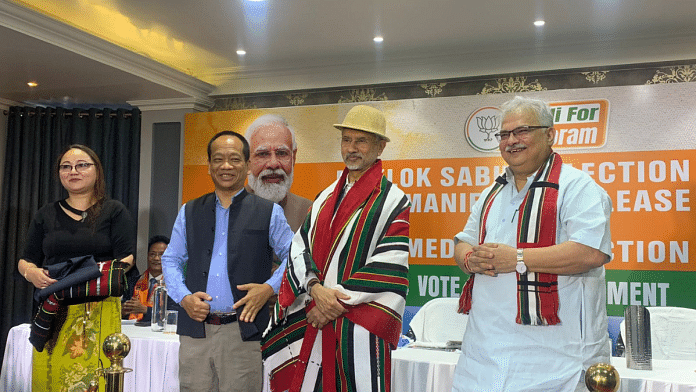Aizawl: External Affairs Minister S. Jaishankar on Thursday said that it is because of the situation in Myanmar that the Centre has taken certain precautions, which includes scrapping the Free Movement Regime (FMR) between the two countries.
“If things were normal in Myanmar, this would not have happened. So, people should understand…,” Jaishankar told reporters in Aizawl.
The Union minister was on a day’s visit to Mizoram to release the election manifesto for the BJP ahead of the Lok Sabha polls.
Pointing to the situation in Myanmar following the February 2022 coup, Jaishankar said “bad practices and illegal activities” are now prevalent in the neighbouring country due to unregulated systems.
“Today, the conditions in Myanmar are very disturbed. In many cases, the authority of the government does not run… So, the security of our country, our state (Mizoram) requires us to take certain precautions. These are precautions we are taking in response to a certain situation,” he explained.
India and Myanmar share a boundary of 1,643 km in the four states of Mizoram, Manipur, Nagaland, and Arunachal Pradesh. Mizoram, in particular, shares a 510 km border with the neighbouring country. The two nations earlier shared a Free Movement Regime (FMR) that allowed people living along the border to travel 16 km into each other’s territories without a visa.
On 8 February, Union Home Minister Amit Shah announced the Centre’s decision to scrap the FMR to ensure the internal security of the country and maintain the demographic structure of India’s northeastern states.
Manifesto release and media interaction in Lengpui, Mizoram. https://t.co/GWmMcWUvTB
— Dr. S. Jaishankar (Modi Ka Parivar) (@DrSJaishankar) April 11, 2024
Jaishankar, meanwhile, acknowledged that the government is sensitive to the interests of the people, customs and traditions, and relationships across the border.
People living on either side of the India-Myanmar border largely belong to the Kuki-Chin-Zomi-Mizo tribe, bound by ethnic and kin ties.
“We are looking at what was the earlier regime of ‘free movement’ — for a certain pattern across the border. We have to wait and see, hopefully… Right now, our neighbour is going through a difficult phase. At some stage, things will become stable. That’s what we hope,” he said.
On Thursday, Jaishankar also said that the current situation in Myanmar has made it “very difficult” to work and complete projects crucial to both the countries.
Acknowledging the challenges, he said the government is trying to negotiate with various groups (ethnic armed organisations) in Myanmar to enable both sides to work seamlessly.
“Because of the current situation in Myanmar, work has been very difficult. But what we are trying to do is negotiate with various groups…”
“It is very important for our development and even for their own future… So, we continue to be at it and we would certainly like the Myanmar part to move forward, but we recognise that there are challenges,” he added.
In March, a delegation led by Rajya Sabha member K. Vanlalvena met with members of the Arakan Army inside Myanmar, and held talks about the road network that is vital for the flagship Kaladan Multi-Modal Transit Transport Project, part of India’s Act East Policy, aimed at enhancing connectivity for mutual benefit.
The India-Myanmar-Thailand Trilateral Highway Project and the Kaladan Project run through Manipur and Mizoram into Myanmar, cutting across territory that has been ground zero of the resistance movement.
(Edited by Tony Rai)
Also Read: Mizoram CM slams historical India-Myanmar border demarcation, calls it British ploy to divide people



